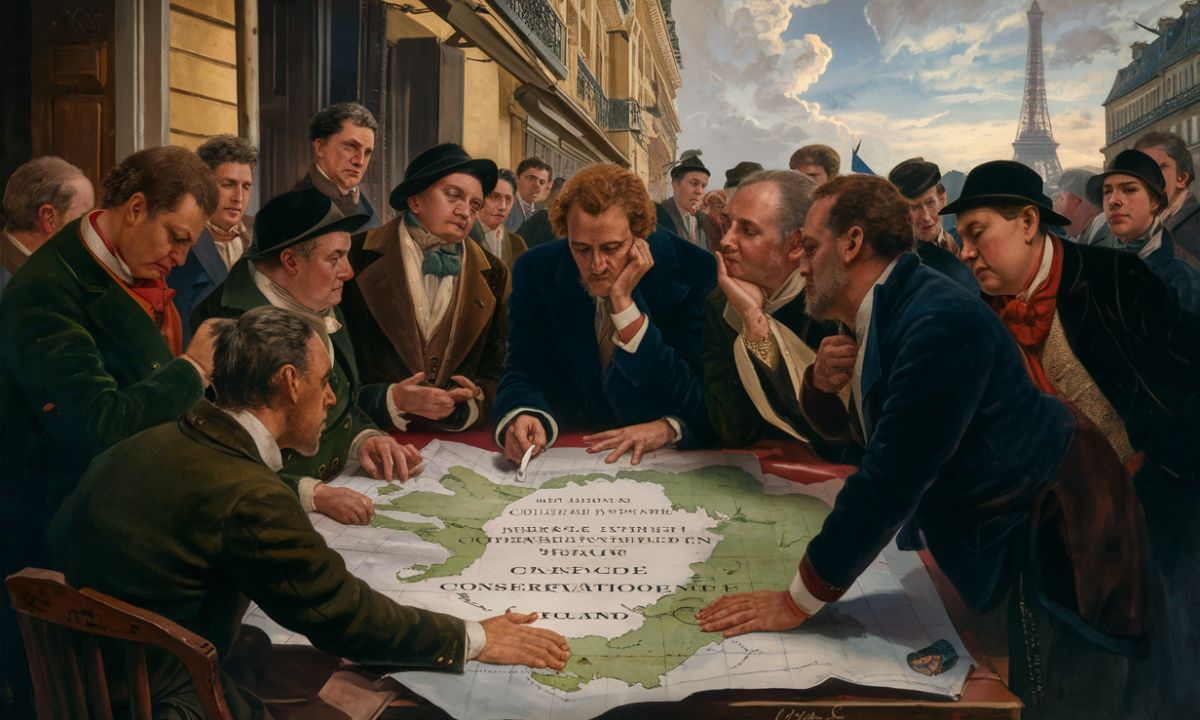The Congress of Vienna stands as one of the most significant diplomatic events in European history, reshaping the continent’s political landscape after Napoleon Bonaparte’s downfall. As Europe’s powers gathered to restore stability and prevent future revolutionary movements, French conservatives emerged as strong supporters of the Congress’s outcomes. Their view can be best summarized as: “The restoration of the monarchy is necessary to ensure stability and prevent further revolutionary uprisings.”
The Conservative Viewpoint in Post-Napoleonic France
The defeat of Napoleon Bonaparte in 1815 marked a turning point in French history, allowing conservative forces to reassert their influence after decades of revolutionary turmoil. French conservatives—comprising royalists, aristocrats, and high-ranking clergy—viewed the French Revolution as a catastrophic period of anarchy and disorder that had devastated France’s political stability, social structure, and moral foundations.
read also:Explore the World with Numberlina.com Travel: Your Definitive Handbook for Thrilling Adventures
For these conservatives, the revolution represented not progress but regression—a dangerous departure from the natural and divinely ordained social order. The conservative ideology that emerged after the Congress of Vienna was fundamentally reactionary, seeking to reverse the changes brought by the revolution and restore France’s pre-revolutionary institutions.
Support for Monarchical Legitimacy
The principle of monarchical legitimacy formed the cornerstone of French conservative thought after the Congress of Vienna. This principle held that sovereign power rightfully belonged to established royal dynasties, whose authority derived from historical precedent and divine sanction.
French conservatives ardently supported the restoration of the Bourbon dynasty, viewing Louis XVIII’s return to the throne as the legitimate correction of revolutionary and Napoleonic usurpations. For them, the Bourbon restoration represented not merely a political change but the reestablishment of France’s proper constitutional order.
The conservative position on monarchy was deeply rooted in religious and philosophical beliefs about the nature of authority. Conservatives maintained that monarchs ruled by divine right, making their authority sacred and inviolable. Any challenge to royal power was seen not just as political opposition but as sacrilege against divinely established order.
Preservation of Social Hierarchy
French conservatives were committed to restoring and maintaining traditional class distinctions that had been severely disrupted during the revolutionary period. The revolution’s assault on aristocratic privileges alarmed conservatives, who believed a natural and necessary social hierarchy was essential for social order and stability.
The following table illustrates the social hierarchy championed by French conservatives:
| Social Class | Role in Society | Conservative View |
| Monarchy | Supreme authority | Divinely appointed ruler essential for national unity |
| Aristocracy | Leadership and governance | Natural leaders by birth and education |
| Clergy | Moral guidance | Essential for social order and religious instruction |
| Bourgeoisie | Commerce and industry | Useful but subordinate to aristocracy |
| Peasantry | Agricultural production | Required guidance from social superiors |
The restoration of aristocratic privileges became a priority for conservatives, who sought to reinstate noble titles, reclaim confiscated lands, and reestablish the aristocracy’s political influence. While they could not fully restore the pre-revolutionary system, conservatives succeeded in securing special legal protections and political advantages for the nobility.
Opposition to Revolutionary Ideals
French conservatives maintained uncompromising opposition to liberty/equality/fraternity—the revolutionary trinity of principles they blamed for undermining France’s traditional institutions. They viewed these concepts not as noble aspirations but as dangerous abstractions that had led to bloody terror and national instability.
In place of revolutionary universalism, conservatives emphasized particularism—the value of local customs, traditional authorities, and historical continuity. They rejected the revolution’s abstract rationalism in favor of emphasis on practical experience and historical precedent.
To combat revolutionary ideas, conservatives supported rigorous censorship of publications, strict control of universities, and surveillance of potential dissidents. The Ultra-royalist faction, representing the most extreme conservative position, advocated harsh measures against anyone suspected of revolutionary sympathies.
The Role of the Catholic Church
The restoration of Catholic Church authority was central to the conservative agenda. During the revolution, the Church had suffered unprecedented attacks—clergy were persecuted, church properties nationalized, and religious practices curtailed. Conservatives viewed these assaults not just as attacks on religion but as fundamental threats to social order and morality.
Under the restored monarchy, conservatives worked diligently to reestablish the Church’s privileged position in French society. They secured the return of church properties, restored religious education, and reaffirmed Catholicism’s status as the state religion.
Religious influence extended beyond spiritual matters into politics, education, and public morality. Conservatives believed that religious instruction provided the essential moral framework needed for social stability, opposing secular educational initiatives and promoting clerical control over schools.
The Impact of the Congress of Vienna on France
The Congress of Vienna provided international support for France’s conservative restoration, establishing the Concert of Europe—dedicated to maintaining stability and preventing revolutionary movements across the continent. This international system bolstered domestic conservative forces by ensuring foreign support against potential revolutionary threats.
Under Louis XVIII and his successor Charles X, conservative policies were implemented to varying degrees. While Louis XVIII attempted to balance conservative principles with limited liberal concessions, Charles X pursued a more aggressively reactionary agenda, alienating moderate elements and eventually triggering the Revolution of 1830.
Conservative influence shaped France’s domestic and foreign policies during the Restoration period (1815-1830). Domestically, conservatives secured legislation favoring aristocratic landowners, restricting voting rights to wealthy elites, and enforcing religious observance. In foreign policy, France joined the conservative powers in opposing liberal and nationalist movements.
Despite these efforts, conservative dominance faced significant challenges. Revolutionary ideals continued to resonate with many French citizens, particularly in urban areas. The growing bourgeoisie resented aristocratic privileges, while workers and peasants suffered under economic policies favoring landed interests.
FAQs About French Conservatives After the Congress of Vienna
What Was the Main Goal of French Conservatives After the Congress of Vienna?
The primary goal was to restore the traditional monarchy and prevent future revolutionary uprisings. Conservatives believed only the Bourbon restoration could reestablish legitimate authority and social stability.
How Did French Conservatives View the French Revolution?
Conservatives viewed the Revolution as a catastrophic period of anarchy and moral degradation that destroyed natural order. They saw it as a dangerous aberration that had unleashed violence and chaos throughout France.
What Role Did Religion Play in French Conservative Ideology?
Religion was central to conservative ideology, with Catholicism seen as essential for moral and social stability. Conservatives worked to restore Church authority and influence over education, politics, and public morality.
How Did French Conservatives Respond to Liberal Constitutional Ideas?
Most conservatives opposed constitutional limits on royal power as dangerous constraints on legitimate authority. While moderate conservatives accepted limited concessions, ultra-royalists rejected any restrictions on the monarch’s divine right.
What Ultimately Happened to the Conservative Vision for France?
The conservative vision achieved temporary dominance but eventually succumbed to liberal and nationalist pressures. The July Revolution of 1830 and the Revolution of 1848 demonstrated the enduring power of revolutionary principles.
Conclusion
The French conservative viewpoint after the Congress of Vienna represented a comprehensive rejection of revolutionary principles and a determined effort to restore traditional authority structures. Centered on monarchical legitimacy, aristocratic privileges, and Catholic Church authority, this conservative vision sought to rebuild France on pre-revolutionary foundations while adapting to post-revolutionary realities.
While the conservative restoration achieved temporary stability, it ultimately failed to resolve the fundamental tensions in French society. The ideals of the French Revolution had permanently altered France’s political landscape, making a complete return to the ancien régime impossible. The conservative era after the Congress of Vienna thus represents not the end of revolutionary politics but rather a significant chapter in the ongoing struggle between tradition and change that would define French—and European—history throughout the nineteenth century.
fore more detalies visit grammargurus

















